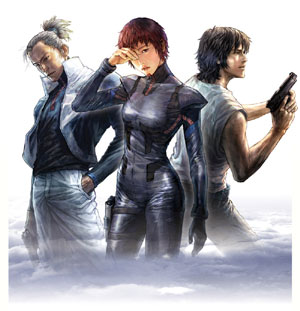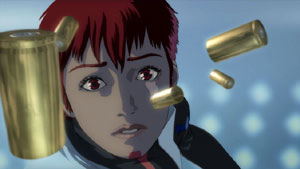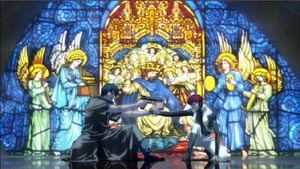| |
|
review | awards | availability | |



Availability:
DVD (Korea)
Region 3 NTSC
Bitwin
2-Disc Set
16 x 9 Anamorphic Widescreen
Korean Language Track
Dolby Digital 5.1, DTS
Removable English and Korean Subtitles
Audio Commentaries, Music Video, Theatrical Trailer,
Making Of Featurette, Director's Note, Gallery, and
Crew Information
*Also Available on Blu-ray Disc
Awards:
• 2004 Gerardmer Film Festival
Winner - Grand Prize in Animation (Kim Moon-Sang)
• 2005 Fantasporto
Film Festival
Nomination - International Fantasy Film Award (Kim
Moon-Sang)

|
|
|
Review by
Calvin
McMillin: |
As the biggest budgeted
animated film in Korean cinema history, Wonderful
Days bears the burden of living up to a tremendous
amount of hype. Whether the film is worthy of such
lavish expense is difficult to say, but evaluated
on its own merits, Wonderful Days delivers
an entertaining and sometimes moving film experience.
The movie's premise
should be vaguely familiar to any fan of sci-fi: more
than a hundred years in the future, the human race
has screwed up the environment to the point that the
earth is shielded from the sun, and the blue sky has
become little more than a myth. The ruling class lives
comfortably in the citadel-like Ecoban, and to protect
their kingdom, they condemn the poor to the ghost
town of Marr and other nearby wastelands, forcing
the underclass to work for them to fuel their living
city.
While cruising Marr
in her snazzy ride, a female law enforcement officer
named Jay bumps into Shua, a childhood friend she
had presumed dead. But in fact, Shua has lived in
exile, joining the rebellion against Ecoban. His mission
is to infiltrate the enemy's inner sanctum and shut
down the system. After some initial resistance, Jay
joins forces with Shua, much to the dismay of Ecoban's
villainous head of security, Simon. The three share
a private history that is revealed over the course
of the narrative, a history that comes to a thrilling
end during their final confrontation at Ecoban. Ultimately,
it will take wits, determination, and a sacrifice
from the unlikeliest sources to bring back the clear
blue sky.
From the get-go, Wonderful
Days boasts amazing visuals, mixing computer graphics
and traditional cel animation with "multi-mation"
and miniatures. The end result is something that is
alternatively sleek and gritty, depending on the occasion.
However, the film is not soulless eye candy; amazingly,
the animators are able to evoke real emotions from
their 2-D creations, giving their characters an emotional
depth that - along with the film's music and cinematic
shorthand - give Wonderful Days, a bombastic,
near operatic tone.
But as mentioned before,
the film isn't wholly original. In fact, the entire
premise of the movie was done more than a decade ago
in Highlander 2. And certainly, the underlying
plot - an oppressed underclass fighting against a
dictatorial elite - isn't anything new either. The
film's rebellion versus empire vibe should raise eyebrows
among the Star Wars faithful. In addition,
the assault on the Ecoban citadel should evoke some
nostalgia for the aerial dogfights of A New Hope.
Although some would
cry "rip-off," it's probably more instructive
to view Wonderful Days as a greatest hits package
of sci-fi tropes. It's an old story made new, which
in itself, is sci-fi at its best. While certainly
not the greatest anime I've ever seen, Wonderful
Days is a landmark film in Korean animation history
and one that shouldn't be missed. (Calvin McMillin, 2005)
|
|